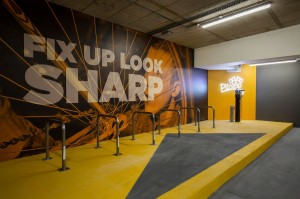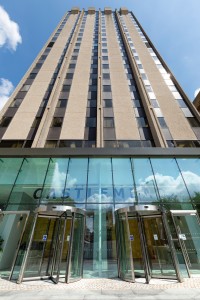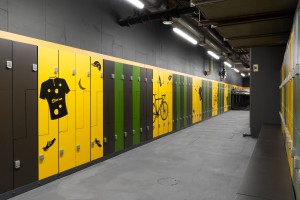The basement of a 1970s Bristol city centre office block has been transformed into the UK’s highest-rated employee cycle area.

Castlemead, opposite Castle Park and at 18-storeys Bristol’s tallest commercial building, is undergoing a £2.1m refurbishment, partly to prepare it for a commuting revolution likely to be sparked by the introduction of the city’s Clean Air Zone later this year.
A key part of the upgrade is the creation of a new cycle storage area.
But rather than just some bike racks and access to showers, the building’s managing agents Knight Frank and Bristol architects Bush Consultancy worked with Bath-headquartered global engineering consultancy Buro Happold to come up with VIP facilities for its bike-commuting workers.
These include a bike repair zone, e-bike charging points, multi-gender showers, secure racking for more than 400 bikes and e-scooters, a drying room and lockers.
To get to the facilities from street level, Buro Happold’s team has even created a special bike lift by replacing the building’s old service lift with a bespoke version dedicated to cyclists.
As a result, the building – home to Amazon, Blue Fin insurance, Royal Sun Alliance, Regus and PR and communications agency JBP – now boasts the country’s highest rated cycling facilities with a Platinum Plus grading and a perfect 100-out-of-100 score from certification group CyclingScore.
Buro Happold associate director Phillip Barnett said with ‘active’ commuting becoming increasingly popular, it was hoped that the state-of-the-art, end-of-ride facilities would support Bristol’s green transport initiatives and encourage Castlemead’s office workers to cycle rather than drive for their daily commute.
“Our challenge was to take CyclingScore’s vision for this really modern, funky facility and fit it into a 1970s concrete basement. From an engineering perspective, that wasn’t easy and we had to think really creatively about how we could make it work,” he said.
“From installing efficient drainage for the washing facilities, to ensuring there is adequate ventilation, to making the facility look attractive so people want to use it, we had to work within the confines of the existing structure to create something new and exciting.”
He said by working with CyclingScore the design team had developed something special.
“As we become ever more conscious of our built environment’s impact on the climate, finding ways of making older, less efficient buildings relevant is going to be critical,” he added.
“This is a brilliant example of how a seemingly inflexible, concrete framed building is being re-imagined to provide contemporary facilities, making it a place where people really enjoy working.”
The next phase of Castlemead’s refurbishment is focused on the main entrance, both inside and out. It includes a new reception area with a striking glass façade and more subtle and welcoming street lighting to draw people into the building.
At the same time vacant floors in the building, which is owned by London-based Floreat Real Estate, are being refurbished to provide open plan office space with improved lighting and environmental controls offering greater flexibility and efficiency to provide a high standard of accommodation for commercial tenants.
It will also have 12 electric car charging points for staff and visitors in the neighbouring multi-storey car park.
Bristol’s Clean Air Zone is due to start in October and is planned to include restrictions on the use of private diesel cars in parts of the city centre between 7am and 3pm.
Drivers of diesel cars straying into the area will incur fines. Castlemead is just inside the inner zone on Lower Castle Street.

































